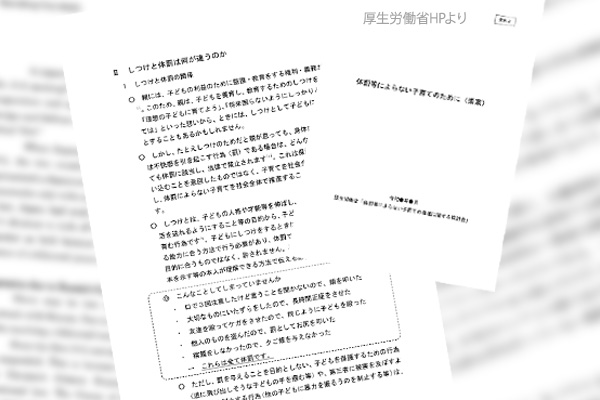Japan’s Ministry of Health, Labor and Welfare released a draft guideline on corporal punishment on December 3 before the revised Child Abuse Prevention Act takes effect in April. After considering comments from a wide range of people, the ministry will finalize the guideline in March. The draft says that any act to cause physical pain or discomfort, however light it may be, amounts to corporal punishment subject to a legal ban. However, corporal punishment differs from disciplined parenting to develop a spirit of independence, endurance and basic lifestyle habits. If disciplined parenting is generally denied for the sake of a ban on corporal punishment, it may add fuel to educational deterioration.
Western countries shifting priority to disciplined parenting
Article 10 of the Basic Act on Education clarifies that “mothers, fathers and other guardians” are primarily responsible for teaching children the habits necessary for life and developing their spirit of independence. On April 28, 2009, the Supreme Court ruled that a teacher’s act of grabbing a boy student by the collar, pushing him to the wall and scolding him loudly did not deviate from educational instructions or amount to corporal punishment.
Parents and other guardians must provide training and parenting to develop their children’s basic habits for life and their spirit of independence. In the United States where freedom in education was mistaken to cause a decline in academic achievements and discipline at school, the government issued a report titled “A Nation at Risk” in 1983 and then Education Secretary Terrel Bell called for learning from Japan.
Under Democratic President Bill Clinton, the government adopted the so-called zero tolerance policy of refraining from tolerating children easily. In New York City that implemented the policy, the number of murder cases dropped by 68% in five years and that of robbery cases by 54%, indicating that public order was restored.
Britain established the “Parenting Order” in 1997 to fine guardians for their children’s refusal to go to school. France revised its compulsory education law in 1998 to sentence guardians to up to two years in prison or up to 200,000 francs in fine for such refusal of their children.
Enact a home education support law to train parents
In consideration of such global trend, Japan’s education ministry has introduced the zero-tolerance policy to address students’ problematic acts. A report in 1998 by a government panel on youths warned that the “road to hell” was paved with good intentions called “educational considerations.”
Balancing carrot and stick is the most important for the benefit of children. There is a report that a program to nurture professional home education supporters and implement their support for parents successfully reduced the number of child abuse cases by 60%.
To resolve the serious child abuse problem, Japan should enact a home education support law to train parents.
Shiro Takahashi is an education specialist and a special professor at Reitaku University Graduate School. He is a director of the Japan Institute for National Fundamentals.


